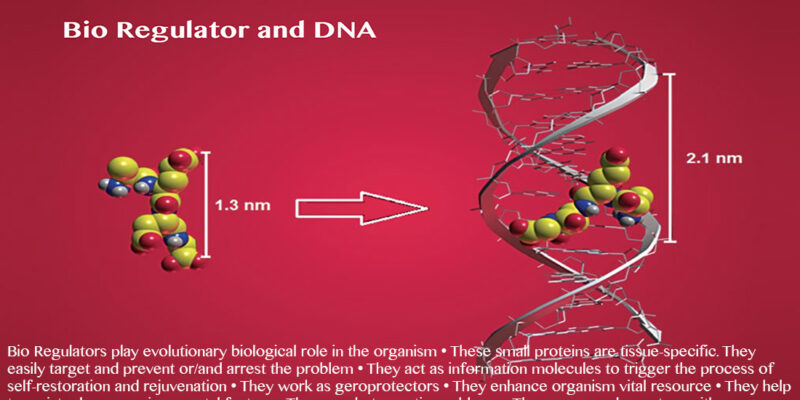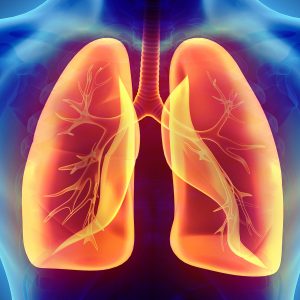PEPTIDES BIOREGULATOR
Home << Peptides Bioregulator
Introduction
Amino acids are biologically important organic compounds composed of amine (-NH2) and carboxylic acid (-COOH) functional groups, along with a side-chain specific to each amino acid. The key elements of an amino acid are carbon, hydrogen, oxygen, and nitrogen, though other elements are found in the side-chains of certain amino acids.
Amino acids can be divided into three categories: essential amino acids, non-essential amino acids, and conditional amino acids. Essential amino acids cannot be made by the body, and must be supplied by food. Non-essential amino acids are made by the body from essential amino acids or in the normal breakdown of proteins. Conditional amino acids are usually not essential, except in times of illness, stress, or for someone challenged with a lifelong medical condition.


Peptides
A molecule consisting of 2 or more amino acids. Peptides are smaller than proteins, which are also chains of amino acids. Molecules small enough to be synthesized from the constituent amino acids are, by convention, called peptides rather than proteins.
It is known that stem cells (SC) are capable of giving rise to cells of the hematopoietic series, which was established by co-cultivation of human embryonic cells with stromal fibroblast lines, and also using growth factors of hematopoietic cells.
Optimal selection of conditions for directed differentiation of SC is the most important task of modern molecular biology and allows us to discover the prospects for using SC in the treatment of major age-related diseases: Alzheimer’s disease, Parkinson’s disease, coronary heart disease and cardiovascular pathology.
One of the groups of substances capable of regulating the activity of stem cells is short peptides. The ability of peptides to induce differentiation of polypotent cells is established. In experiments on animals and cell cultures, it was found that these peptides contribute to the induction of the synthesis of regulatory proteins, affect the proliferation and differentiation of cells, and show tissue-specificity.
In this regard, one of the research areas of the company was the study of the effect of short synthetic peptides on the proliferation of human mesenchymal stem cells (MSCs).
As a result of the work, it was found that short peptides, depending on their structure, are able to activate the proliferation of MSCs, contributing to the maintenance of reserve capabilities of the body, which is especially important in the accelerated and natural aging of various organs and tissues.
Peptides and Genome
Short peptides are a system of signaling molecules that regulate body functions at the molecular, genetic, subcellular, cellular and tissue levels. One short peptide can regulate the expression of several dozen genes, but the molecular mechanism of this process remains open. The scientists of our company came to the conclusion that short peptides are able to penetrate through the cytoplasmic and nuclear membrane of the cell and bind to DNA.
In the modern literature there is evidence that short peptides are able to regulate gene expression. The question remains about how this regulation works: whether short peptides penetrate through the cytoplasmic and nuclear membrane, and then bind to DNA, or they bind to receptors (intracellular or on cell membranes) and activate intracellular signaling cascades, which result in is a change in the expression of genes.
Previously, our scientists have shown that FITC labeled di, tri and tetrapeptides penetrate the cytoplasm, nucleus and nucleolus of HeLa cells. It is known that the nucleus of eukaryotic cells has a system of nucleopores formed by protein complexes – nucleoporins. The internal diameter of the nucleopores is about 50 nm. Consequently, they are permeable to freely diffusing low-molecular substances with molecular weights up to 3500 D. Thus, short peptides can penetrate through the cytoplasmic and nuclear membrane of the cell in their physicochemical characteristics (charge, size, hydrophobicity) and interact with DNA.
Based on data on the effect of peptides on gene expression and protein synthesis and the results of molecular modeling, we have developed a scheme for the peptide regulation of gene expression.
Short peptides penetrating the cell bind to complementary sites in the promoter zones of the DNA genes, as a result of which the corresponding mRNA is synthesized and the translation process is started. Thus, peptides regulate gene expression and protein synthesis, which determine the most important stages of the cell’s life-proliferation, differentiation, and apoptosis.
The specific (complementary) peptide of the DNA interaction epigenetically controls the genetic functions of the cell, and this mechanism probably played an important role already at the earliest stages of the origin of life and further evolution.

Aging and protein synthesis
Aging is a major risk factor for disease and death but what is the cause of aging? Despite many theories it is still unknown. What we know is that as we age our body produces fewer proteins that have a large number of important functions in our body. For example:
- Proteins are vital to cell division, which is necessary for growth, reproduction and healing.
- Many proteins keep everything working right by regulating chemical reactions. Examples include enzymes, hormones, blood clotting substances, even receptors in the eyes.
- Protein is essential for the immune system to defend against foreign invaders such as bacteria and viruses.
- Proteins help to transport other nutrients around the body by binding to them and then releasing them when and where they are needed.
- Protein helps to regulate and maintain a proper fluid balance. This helps to maintain proper blood pressure and even lubricate eyes.
- Certain proteins serve a major structural role in tissues such as muscle and skin and even provide the matrix for bones and teeth.
Basically, our bodies make thousands of specific proteins that serve important roles in everyday functioning— in fact, the human body is about 45% protein on a dry matter basis.
As aging is associated with a decline in the synthesis of protein, it is logical to assume that if the synthesis is restored aging can be slowed down. As it turns out this assumption is correct. Scientists V. Khavinson and V. Morozov have found a way to repair protein production and have achieved incredible results. Using the following methods can increase lifespan by 20-40%.
Triggering molecules
The information about different proteins is stored in the DNA. In order to launch protein synthesis a DNA fragment, a gene, has to be activated by triggering molecules, peptides. Peptides are relatively short chains of amino acids and they are an essential part of the cell self-regulating mechanism:
Cells constantly degrade aged proteins by breaking them down into amino acids and peptides. Some of these peptides match specific parts in the cell DNA following the lock-key principle. As a result, the peptide resumes the synthesis of the protein from which it was originally built. When the protein ages, it is fragmented into the same peptides once again. All of this forms a circular process that is vital to cell life.
However, due to extended exposure to environmental hazards and stress this cell self-regulating mechanism is compromised and we become peptide deficient. Peptide deficiency leads to cell malfunction and eventually to diseases and premature aging. Luckily, we can restore the peptide-protein cycle with peptide supplements.
Eventually, peptides have been extracted from almost every body system and demonstrated stunning tissue-specific properties, i.e., they have beneficial effects on the organs which they were extracted from.
In the last 40 years these medicines have been taken by more than 15 millions of people and no side effects have been found. The fact is that peptides are apparently evolutionarily the oldest cell self-regulating mechanism and as their structure is quite simple they have not undergone any constructional changes over time. That means that peptides in animals and humans are identical. Besides it was also proven that peptide intake can only normalize the protein synthesis and cannot overstimulate it as a cell cannot take more peptides than it needs.
Bioregulator supplements
For many years the peptide preparations were available only as medicines, in the form of injections. Now we created dietary supplements that can also reduce peptide deficiency and restore peptide-protein cycle in cells. They can be divided into natural and synthesized Bioregulators.
Natural Bioregulators

Natural Peptides is a group of peptides of less than 50 amino acids and with a molecular mass of less than 5 kDa, free from foreign DNA or protein substance, extracted from organs and tissues of young calves by a patented method of thorough filtering. 5 kDa is very little. The molecular mass of DNA fragments and proteinaceous infectious particles, the prions, are several times bigger than that. Therefore these Bioregulator supplements are extremely clean products. They do not have any immunogenic or mutagenic properties.
Inside the gastrointestinal tract, the natural peptides break down into amino acids and di-, tri- and tetrapeptides that match the DNA in a complementary way and activate protein synthesis in the respective body system. Their performance is gentle and gradual. Their effect continues to grow even after finishing the supplementation course and lasts up to 4-6 months until the peptide-protein cycle is impaired again.
Synthesized Bioregulators
The analysis of natural peptides was used to detect the most active peptide from a group, which was later replicated in a lab. Synthesized Peptides supplement contains only one peptide molecule whereas natural one includes a group of molecules. Synthesized peptides have an immediate impact compared to natural peptides and have a faster, yet more short-lived effect (1.5-2 months). Such Bioregulators are typically used to start the initial peptide deficiency treatment. However, it is advised to switch to natural peptides as a follow-up course.
Both types of peptides are efficient, safe to use, have no side effects and are compatible among themselves and with other products. As for the choice between natural and synthesized peptides, it depends on a particular situation. However, in most cases synthesized peptides, if available, are administered prior to the use of natural peptides.
When and how to take Bioregulators?
It is advised to start taking peptide supplements upon reaching 35 years of age as a preventive measure against premature aging. At this stage two to three 10-day courses of the basic products per year are sufficient to maintain the body’s well-being. These basic products are Vladonix, Cerluten, Ventfort, Sigumir, Svetinorm and if a person works night shifts or often takes intercontinental flights, Endoluten. They regulate the function of the systems that age faster. If required, other peptides could be added as another ten-day course, based on individual needs.
Starting from 40-45 years, two courses a year become necessary, with 2 capsules daily for 30 days per course. The health in the decades to follow will majorly be influenced by the degree of recovery achieved during this period. It is crucial to start timely biannual intake of extensive anti-age courses that include Endoluten, Vladonix, Cerluten, Ventfort, Sigumir, Svetinorm, Chelohart and for men Libidon, Testoluten, for women Zhenoluten and Thyreogen. Additional products are chosen based on individual needs and predispositions. Generally, the older we get, the more organs that require additional support.
Starting from 50-55 years, it is generally recommended to increase the number of courses a year from two to three. If you need to take more than 5 peptide products it is usually advised to split the course in several months so that each month you take 5 products or fewer. Please note for better absorption peptides are taken 30 minutes before meals.
When and how to take Bioregulators?
It is advised to start taking peptide supplements upon reaching 35 years of age as a preventive measure against premature aging. At this stage two to three 10-day courses of the basic products per year are sufficient to maintain the body’s well-being. These basic products are Vladonix, Cerluten, Ventfort, Sigumir, Svetinorm and if a person works night shifts or often takes intercontinental flights, Endoluten. They regulate the function of the systems that age faster. If required, other peptides could be added as another ten-day course, based on individual needs.
Starting from 40-45 years, two courses a year become necessary, with 2 capsules daily for 30 days per course. The health in the decades to follow will majorly be influenced by the degree of recovery achieved during this period. It is crucial to start timely biannual intake of extensive anti-age courses that include Endoluten, Vladonix, Cerluten, Ventfort, Sigumir, Svetinorm, Chelohart and for men Libidon, Testoluten, for women Zhenoluten and Thyreogen. Additional products are chosen based on individual needs and predispositions. Generally, the older we get, the more organs that require additional support.
Starting from 50-55 years, it is generally recommended to increase the number of courses a year from two to three. If you need to take more than 5 peptide products it is usually advised to split the course in several months so that each month you take 5 products or fewer. Please note for better absorption peptides are taken 30 minutes before meals.
Conclusion
There is still no way to stop aging but thanks to the scientists’ intensive work during the last 40 years, we finally have dietary supplements that substantially slow down aging by reducing peptide deficiency and restoring cell peptide-protein cycles in the body. There are natural Bioregulator products and synthesized ones that cover almost every body system and organ. Thus, if you want to live longer being mentally and physically healthy you have now a real solution.
Examples of Bioregulators :
Digestive system: Svetinorm, Suprefort, Stamakort or Ovagen, Vesugen, Crystagen
Vascular system: Ventfort, Svetinorm, Vladonix or Vesugen, Crystagen
Cardiovascular system: Chelohart, Ventfort, Svetinorm
Central nervous system: Cerluten, Ventfort, Svetinorm or Pinealon, Vesugen, Ovagen
Immune system: Vladonix, Endoluten, Ventfort or Crystagen, Vesugen, Ovagen
Locomotor apparatus: Sigumir, Ventfort, Vladonix or Cartalax, Vesugen, Crystagen
Carbohydrate metabolism: Suprefort, Endoluten, Ventfort
Respiratory system: Chonluten, Crystagen, Vesugen
Lipoprotein metabolism: Svetinorm, Suprefort, Ventfort
Thyroid gland: Thyreogen, Ventfort
Vision: Visoluten, Cerluten, Ventfort
Kidneys: Pielotax, Ventfort
After radio and chemotherapy, psycho-emotional stress and similar adverse factors:
Vladonix, Svetinorm, Endoluten or Vesugen, Ovagen, Chonluten

